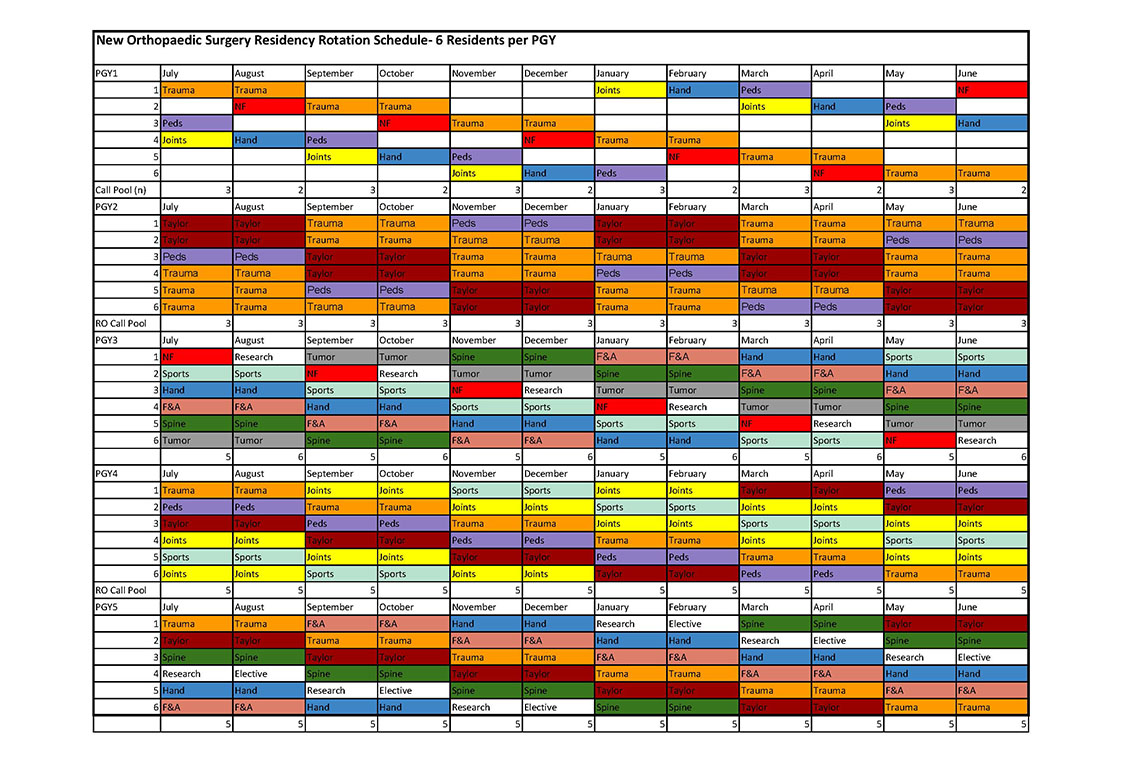Curriculum
The Corewell Health orthopedic residency program features a comprehensive, hands-on educational experience across the 8 core orthopedic subspecialties: foot & ankle, hand, joint reconstruction, pediatrics, spine, sports, trauma, and tumor. Clinical competency and technical skills are refined through bio-skill labs, cadaveric dissections, didactics, and journal clubs.
Rotation breakdown by year of training
To better familiarize medical students with the field of orthopedic surgery, as well as resident life at the Corewell Health William Beaumont University Hospital medical students are invited to apply for a 4-week elective rotation. Students will be assigned an orthopedic surgical subspecialty and work closely with an assigned faculty mentor and senior orthopedic resident. Students will only rotate through the Corewell Health Royal Oak campus and are not expected to travel to other clinical facilities. Through the rotation, medical students will be:
- Provided with a rigorous, hands-on operative experience
- See patients in the Corewell Health Orthopedic Institute – resident teaching clinic
- Attend daily morning didactics and conference
- Take (1) 12-hour Friday evening call and (1) 24-hour Saturday call
- Present a 10-minute lecture at the end of the rotation
Visiting medical students may apply for the Corewell Health Hospital, Royal Oak and Taylor Orthopedic away rotation through the AAMC Visiting Student Application Service.
Orthopedic residency application process

Click image to enlarge.
First year:
- 6 months of orthopedic surgery
- 3 months of trauma
- 1 month of sports medicine
- 1 month of hand
- 1 month of night float
- 6 months of off-service rotations
- 1 month of vascular surgery
- 1 month of plastic surgery
- 1 month of general surgery trauma
- 1 month of anesthesia
- 1 month of MSK radiology
- 1 month of the Surgical Intensive Care Unit (SICU)
Second Year:
- 3 months of: Corewell Health Taylor (general orthopedics), trauma, and pediatrics
- 2 months of joint reconstruction
- 1 month of night float
Third Year:
- 2 months of: foot & ankle, hand, tumor, and sports medicine, spine
- 1 month of: night float, and research
Fourth Year:
- 3 months of: joint reconstruction, pediatrics
- 2 months of: trauma, spine, and sports medicine
Fifth Year:
- 3 months of Corewell Health Taylor (general orthopedics)
- 2 months of: elective (1-month blocks), foot & ankle, hand, trauma
- 1 month of research
Evening and weekend call scheduling
First/third year:
- Saturday call– 1 PGY 1’s and 1 PGY 3
- Night float – 1 PGY 1 and 1 PGY 3
Second year:
- Weekend call – 2 PGY 2’s
- Night float – 2 PGY 2’s
Fourth/fifth year:
- Back-up call
Night Float
- Sunday – Thursday 5:00 pm to 6:00 am
Weekend call
- Friday 5:00 p.m. to 8:00 am and Sunday 8:00 am to 5:00 pm
Saturday call
- Saturday 8:00 am to Sunday 8:00 am
Core academics and educations
Clinical and surgical training is enhanced by a rigorous comprehensive didactic program.
Morning Didactics
- Monday
- Fracture conference – Bi-weekly review of trauma cases with an emphasis on radiographic interpretation, evidence-based management, and operative management
- Spine conference – Bi-weekly fellow-led didactics reviewing common spine pathologies and management
- Tuesday
- Resident/attending lectures – Weekly lecture-based series reviewing common topics encountered in the orthopedic setting
- Bio-skills – Hands on learning centered on physical exam maneuvers, casting techniques, saw-bone simulations, and surgical skill refinement. Sessions are held in the nationally recognized Applebaum Surgical Simulation Center
- Wednesday
- Subspecialty conference day – Attending and fellow-led lectures, case-based learning, and journal clubs
- Thursday
- Anatomy prosections – Weekly prosections led by second-year residents with a strong emphasis on anatomical relationships, surgical approaches, and clinical relevance
- Friday
- Interesting case conference – Weekly review of unique orthopedic cases presented in classic Socratic method. These scenarios seek to refine critical thinking and case management among residents.
- Grand Rounds - Monthly conferences and case-based discussions featuring nationally recognized, guest speakers from across the country.
Supplemental education
Journal clubs
Residents participate in many journal clubs throughout the year. Most notably, each month a residency-wide journal club is held at a local restaurant to discuss new, landmark studies. Additional subspecialty journal clubs may also be held on a monthly or biweekly basis. Through these academic discussion with the faculty and their colleagues, residents become facile at critically appraising the scientific literature and applying it to their surgical acumen.
Arthroscopy wet lab sessions
Faculty-led, arthroscopy sessions on utilizing cadaveric extremity specimens. Sessions help familiarize residents with the use of arthroscopic cameras, tools, implants and techniques.
Anatomy week
A week-long session where residents work alongside with orthopedic faculty to practice various surgical approaches and procedures on cadaveric specimens. In this low-risk and safe environment, residents obtain a fully hands-on experience to learn the critical thinking and surgical techniques to achieve reproducible surgical outcomes. Previous sessions have included total hip arthroplasty, intramedullary femoral nail placement, total shoulder arthroplasty, distal radius plate fixation, trigger finger releases, and more.
Contact us
Elizabeth Marentette
Program manager
Phone: 248.551.1852
Email: Elizabeth.Marentette@corewellhealth.org
Michela Dicicco
Program manager
Phone: 248.551.3140
Email: Michela.Dicicco@corewellhealth.org

